There are two types of people.
Type 1: Holy SHIT Harley Quinn will be in Suicide Squad!
Type 2: Wait, who the hell is Harley Quinn?
For Type 2, Harley Quinn is a fan favorite amongst DC Comics fans, who has gained an immense amount of love since her debut in 1992 in “Batman: The Animated Series.” She is fun-loving, silly and adorable, and after viewers of the show adored her in the ’90s, Harley Quinn was added into the comic books and even given her own series for a while.
The girlfriend of the Joker, the best friend of Poison Ivy and #45 on the “Top 100 Comic Book Villains” list, Harley has climbed quite high since her inception 24 years ago.
But why?
A lot of people have asked this question. Many find it disturbing that the abused girlfriend of a psychopath who regularly murders people has somehow become so popular in the short time she has been around. And 24 years is very short. Batman has been around since 1939, the Joker a year later and even Deadshot, one of the other main villains in the upcoming movie “Suicide Squad” has been around since 1950 (and you definitely have heard Harley Quinn’s name more than you’ve heard Deadshot’s).
To answer this question, you have to go back to the beginning.
Harley’s first appearance was in “Batman: The Animated Series,” an episode called “Joker’s Favor.” This episode highlighted the vicious, psychopathic nature of the Joker, who was cursed out by an ordinary man for cutting him off in traffic, and in retaliation, the Joker takes the man’s license and promises to collect a favor from him one day.
He cashes in on that favor two years later, having kept track of the man who cursed him out for all of that time and threatening him enough to make the poor guy move his family several states away. The guy has no option but to help the Joker, but the only task he has is opening a door for a Miss. Harley Quinn.
Throughout this rather dark children’s episode, Harley was a beacon of fun. As the Joker’s regular henchmen listen absentmindedly to the Joker’s rants, jumping in fear when the attention is laid on them, a certain woman in a jester costume adores the Joker’s attention, calling him “Mistah J” in a delightful Brooklyn accent.
She smiles as she cuts his hair, hits a police office when he harasses her and introduces the Joker as a part of his act (a feat no previous henchman or henchwoman had ever been allowed to do by the Clown Prince of Crime, who prides himself on his showy ways of breaking the law). She is silly, doting of the Joker and plainly awful at fighting, as Batman disarms her rather quickly.
The reason that Harley was brought in was because the writers wanted someone to jump out of a cake, but thought it would be strange if the Joker did it himself. Funnily enough, the Joker ended up doing it anyway, but Arleen Sorkin voiced this new character Harley so wonderfully that they kept her in the episode.
She ended up being featured more and more, until it became clear she was the Joker’s girlfriend in “Harley and Ivy,” the episode that created the long-lasting friendship between Harley Quinn and Poison Ivy. Harley is kicked out of the Joker’s lair (quite literally), and she joins up with Poison Ivy who tries to convince her of the Joker’s abuse.
The Joker, furious that Harley has made a name of her own without him, comes to collect her, and Harley forgives him happily despite the fact he never actually apologizes. This cycle becomes routine as Harley was introduced in more and more mediums, a cycle that those who have experience in abusive relationships can perhaps relate to.
Harley does not enjoy violence the way the Joker does, nor does she ever harm people when she can avoid it.
Her crime sprees are usually at the order of someone else, or simply for the reason of stealing something she wants. She, at her core, is a good person. It is her creation that twisted her values, and tied her entire being to the Joker himself.
When Harley became very popular in the animated series, the creators of the show wrote her origin story in a comic book called “Mad Love.” Readers learn that Harley was once the Joker’s psychiatrist in Arkham Asylum, but completely unqualified for the position as she seemed to have earned her place by sleeping with a professor or two at college.
The Joker immediately takes advantage of Harley’s inexperience, and twists her world until she falls hopelessly in love with him. She frees him from Arkham when he returned with a rather gruesome beating from Batman, donning a jester costume herself and joining him for his life on the run.
The fact that the Joker turned this woman from the respected Dr. Harleen Quinzel to the daffy, goofy, silly Harley Quinn displays the Joker’s manipulative intelligence, and it explains why Harley has never fully been able to rid herself of his abusive influence.
And it is abusive.
As much as the Joker is adored by comic book fans everywhere, it is painful to read those comics in which the Joker hits or punches Harley or verbally abuses her until she cries. In that same comic “Mad Love,” he pushes Harley out of a window since she tried to make him happy by killing Batman for him, only for her to forgive him in the same issue when he sends her a rose. When Harley was introduced in the real comic books, the Joker realizes he has started to have feelings for her, so he shoots her off into a rocket.
Luckily, she is saved by Poison Ivy, where their friendship — a sometimes sexual relationship — is born in the comics (although Poison Ivy is perhaps just as controlling and verbally abusive as the man she so abhors Harley spending time with). Harley’s ability to make friends is unmatched by any evildoer in the Batman world, as most villain partnerships are simply that: partnerships. But Harley’s relationship with both the Joker and Poison Ivy is out of love. This is why Harley has become so popular in the last 24 years. This is why people adore her.
Harley’s greatest flaw is her love for those who don’t deserve it, and everyone can relate to that.


















[…] Si ça vous tente, quelques articles (en anglais) qui m’ont aidé à préparer ce post : – L’avis d’une ancienne victime sur la façon dont les relations abusives sont dépeintes dans les médias, repris par cet article – Une analyse des évolutions du personnage d’Harley, sur le site de Vanity fair – Deux articles qui s’interrogent sur les raisons du succès d’Harley, sur IGN et studybreaks […]
[…] Si ça vous tente, quelques articles (en anglais) qui m’ont aidé à préparer ce post : – L’avis d’une ancienne victime sur la façon dont les relations abusives sont dépeintes dans les médias, repris par cet article – Une analyse des évolutions du personnage d’Harley, sur le site de Vanity fair – Deux articles qui s’interrogent sur les raisons du succès d’Harley, sur IGN et studybreaks […]
[…] Quinn is arguably the most popular character at DC as of this writing. If you’re reading this you should have a […]
[…] Quinn is arguably the most popular character at DC as of this writing. If you’re reading this you should have a […]